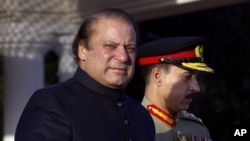Pakistan’s new Prime Minister Nawaz Sharif on Friday introduced a 25-member federal cabinet to deal with what analysts say is a sinking national economy, energy crisis and the threat of militancy facing the nuclear-armed country.
The federal ministers, including two women, were sworn in by President Asif Ali Zardari at a ceremony in the presidential palace where Prime Minister Sharif and the Pakistani military leadership were also present.
The new cabinet is made up of senior leaders of Mr. Sharif’s ruling Pakistan Muslim League-N party and most are his close aides with experience in dealing with economic, energy and other issues facing ordinary Pakistanis.
They include former finance minister Isaq Dar, Chaudhry Nisar Ali Khan, Ahsan Iqbal, Khawaja Asif and Pervez Rasheed.
Analysts and federal ministers acknowledge the national economy has never been in such a bad shape since the inception of Pakistan and tackling the economy will be the most difficult of all the challenges.
Federal Minister Shahid Khaqan Abbasi sounded upbeat after taking the oath of office.
He said the new government knows that time is short but it is determined to provide relief to ordinary Pakistanis by fixing problems like nation-wide power outages, unemployment and inflation.
"The economic challenges facing the country are quite serious but we feel that we have the expertise, the ability and the experience to deal with these issues. And we are very hopeful that you will see a change not in a matter of years but in a matter of months and weeks," Abbasi said.
Economists like Ashfaque Hasan Khan of the NUST Business School in Islamabad say that the Sharif government will need to make bold decisions and introduce long-awaited reforms to broaden the tax base and revive bleeding public enterprises. He says that without taking these measures, Pakistan’s attempts to seek financial help from foreign donors will face difficulties.
"Pakistan will have to follow massive tax and expenditure reforms along with growth (-related) critical reforms in the economy. Unless and until we do this the international community will not come to help or assist Pakistan," Khan said.
Analysts believe that the economic turnaround is essential to ensure political stability in Pakistan, a key partner in the U.S.-led war against terrorism.
Prime Minister Sharif’s party officials, without elaborating, have stated that for the time being, he is expected to keep the foreign ministry portfolio for himself.
The victory in May 11 parliamentary polls enabled the 63-year-old politician to become Pakistan’s chief executive for an unprecedented third term. In his acceptance speech before the parliament Wednesday, Mr. Sharif promised to address the nation soon to present his plans aimed at dealing with the nation’s economic and energy challenges.
He has also pledged to devise a national policy with the help of allied and opposition parties to try to seek an end to the Taliban-led militancy plaguing northwestern regions of Pakistan.










